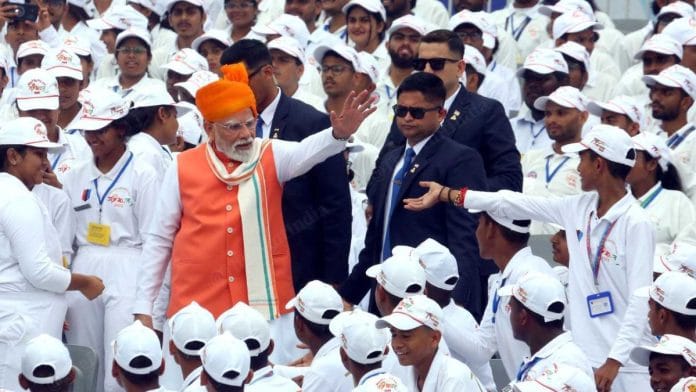New Delhi: Prime Minister Narendra Modi Friday announced the setting up of a task force to suggest next-generation reforms in governance, in a bid to promote India’s economic growth and realise the Viksit Bharat dream by 2047.
“This task force will work within a set time-frame to align existing laws with the needs of the 21st century and prepare the nation to become ‘Viksit Bharat’ by 2047,” Modi said while addressing the nation on the 79th Independence Day.
The task force will evaluate all current laws, rules, and procedures related to economic activities. It will suggest ways to reduce compliance costs for startups, MSMEs, and entrepreneurs, provide freedom from fear of arbitrary legal actions and ensure laws are streamlined for ease of doing business.
The reforms suggested by the task force will help in creating a supportive ecosystem for innovation, entrepreneurship, and economic growth, Modi said.
Slew of reforms initiated since 2014
The Modi government has initiated a slew of reforms since it came to power for the first time in 2014 to ensure ease of doing business.
Speaking about it in his 12th consecutive Independence Day address, the PM said his government has abolished over 40,000 unnecessary compliances and repealed more than 1,500 outdated laws. “Dozens of other laws were simplified in Parliament, always keeping citizens’ interests at the forefront.”
He also mentioned how in the ongoing monsoon session of Parliament, over 280 provisions were removed from the income tax law, making governance simpler and more accessible for every Indian. “Reform is not just about economics, it is about transforming the everyday lives of citizens,” he added.
From income tax reform to faceless assessment for more transparency and efficiency, to zero tax for annual income up to Rs 12 lakh, the PM spoke about the numerous reforms undertaken by his government.
Replacement of outdated criminal laws was another example he cited.
The PM said these reforms signal a modern, citizen-centric government where ordinary people can experience ease, fairness, and empowerment.
Modi added that India is committed to structural, regulatory, policy, process, and procedural reforms, building a nation where governance works for the people, not the other way around.
(Edited by Gitanjali Das)
Also Read: Modi’s ‘Diwali bonanza’ for the common man—next-gen GST reforms, lower tax on daily-use items soon






